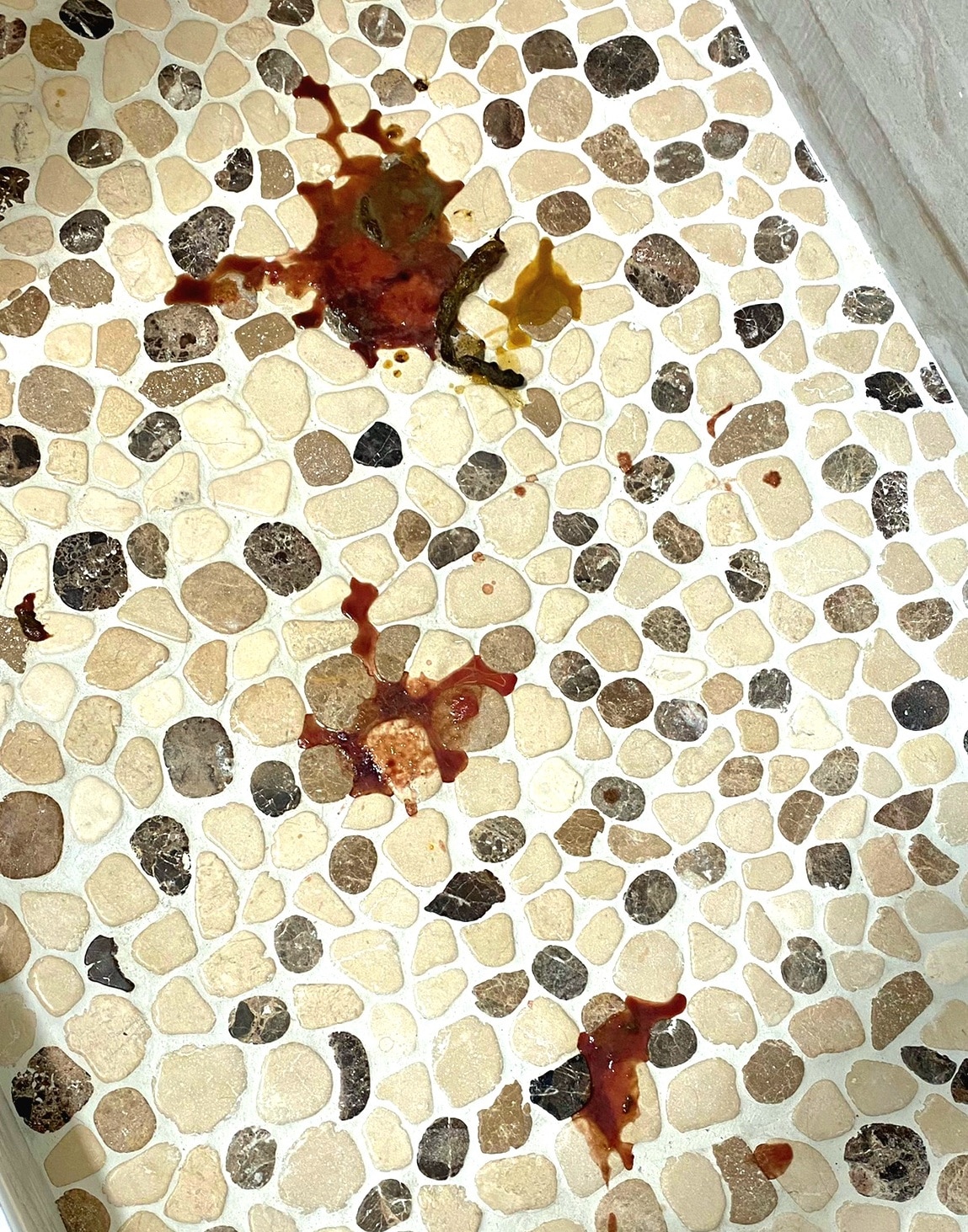Dog Pooping Blood: Common Causes and What To Do
SolStock/iStock / Getty Images Plus via Getty Images
As a pet parent, it’s important to create a habit of checking your dog’s poop. Dog poop (or “stool”) can tell us a lot about a dog’s health. In fact, changes in color, consistency, and frequency of your dog’s poop can be one of the first signs of illness.
One of the most concerning changes you may notice in your dog’s poop is the presence of blood. If your dog is pooping blood, it’s helpful to know what to do and when to seek treatment.
The first thing your veterinarian will ask are questions aimed at figuring out what might have caused it.
Key Takeaways
- Bloody stools in dogs can be caused by many different things, including infections, parasites, or cancer.
- If your dog is pooping blood, the best thing to do is call your vet for advice.
Health Tools
Not sure whether to see a vet?
Why Is My Dog Pooping Blood?
Seeing blood in your dog’s poop is alarming, and it can be caused by several factors.
Eating Something Bad or a Switching to a New Food
Bloody poop in dogs can be a consequence of something affecting your pup’s digestive tract (this can occur anywhere in the stomach, small intestine, colon, or anal region).
Common conditions affecting the digestive tract (GI tract) include inflammation that’s called gastroenteritis, or acute hemorrhagic diarrhea syndrome (AHDS) when blood is also present.
Either of these can occur when your dog has eaten something they shouldn't have, termed dietary indiscretion. This can include non-food items, such as:
You can help prevent dietary indiscretion by putting your dog in a dog crate or behind a dog gate in a dog-proofed room whenever you need to leave them unsupervised.
Bloody poop in dogs can also occur when dietary changes have been made, such as when a new food, treat, or chew toy is introduced, or when your dog has eaten another pet’s food or when fed a raw or uncooked diet.
Infections, Parasites, or Cancer That Affects the GI Tract
Other conditions that can affect the digestive tract, leading to bloody poop in dogs, include:
-
Infections (bacteria or viruses such as salmonella or parvovirus)
-
Parasites (intestinal worms, coccidia, giardia), which can be transmissible to people
-
Pancreatitis (inflammation of the pancreas)
Diseases or Issues That Affect Blood Clotting
Bloody poop in dogs can also be seen with conditions “outside” the digestive tract. This may include issues that affect normal blood clotting, such as:
-
Bleeding disorders
-
Toxins like rodenticide poisoning
-
Kidney disease
-
Diseases of the immune system, such as immune-mediated thrombocytopenia (ITP)
-
Hormonal disorders
-
Cancer
Other diseases or conditions that cause bloody poop in dogs include:
-
Trauma
-
Intussusception (folding of the intestines)
What if Your Dog Is Pooping Blood and Vomiting?
If your dog is passing blood in his stool and vomiting, see a veterinarian immediately.
Loss of fluid through vomiting along with loss of blood and fluid in the stool can lead to serious and life-threatening dehydration. This can also be a sign of a more serious underlying disease.
What Does Blood in a Dog’s Poop Look Like?
Bloody stool can appear in several different ways. The color and appearance of the blood helps determine which part of the digestive tract the blood is coming from.
Hematochezia: Bright Red Blood in a Dog’s Poop
“Hematochezia” is the term used to describe when there is bright red blood in a dog’s poop. In this case, the blood is bright red because it is coming from the lower part of the digestive tract (colon or anus and rectum).
It is also bright red because it has not gone through the entire digestive process and typically looks “fresh” when it exits the body.
When hematochezia is seen, it often accompanies diarrhea and will have a red-tinged appearance. The dog will likely go to the bathroom with increased frequency and may have a larger volume of stool. The consistency can range from a soft, formed texture to completely liquid.
Sometimes formed stool will also be covered in mucus, and the blood will appear to be on the outside of the poop. This also indicates an issue with the lower part of the digestive tract, like the colon.

Melena in Dogs: Black and Tarry Poop
In the case where blood comes from the upper part of the digestive tract (the stomach or small intestine), it will appear dark to almost black and tarry.
Some pet parents are not aware that dark stool can mean the presence of blood. This is called melena.
Melena in dogs can occur with any condition that affects the stomach or upper part of the intestine, including inflammation, ulcers, and cancer.
With melena, a dog’s poop usually looks more solid.
Dog Is Pooping Pure Blood
It’s also important to note that in some cases, you may see your dog pass only blood with no poop. If the stool is liquid, or the gut is empty, blood may be all that comes out.

What To Do if Your Dog Is Pooping Blood
If your dog is pooping blood, the best thing to do is to call a veterinarian for advice. In some cases, a conversation over the phone can help determine whether your dog needs to be examined right away.
At-Home Care
There are some instances when at-home care may be appropriate.
For instance, eating colored foods such as beets or red-dyed treats can give the false appearance of blood in a dog’s stool.
Think about all the things your dog may have been exposed to or given in previous days. This will help you and your vet determine the next best steps.
When To Go to the Vet
If your dog starts pooping blood and displays any of these symptoms, take him to the vet immediately:
-
Pale gums (white or pale pink instead of a normal salmon pink color)
-
Vomiting
-
Pushing to have a bowel movement and little to nothing comes out (tenesmus)
-
Your pup becomes unresponsive
These symptoms could signify shock and a more serious disease.
Diagnosing Blood in a Dog's Stool
Your vet will want to perform a thorough physical examination which may include a rectal exam.
During this exam, your vet will check your pup for tumors, foreign objects, and anal gland issues.
They will also check your dog’s lymph nodes and will perform an abdominal palpation. They’ll look for pain, swelling, or abnormal organs.
Additionally, your veterinarian may recommend the following diagnostics:
-
Stool exam, which will look for abnormal bacteria and parasites. It can also verify blood is being passed in the stool.
-
Giardia and parvo SNAP tests
-
CPL or pancreatitis testing
-
Routine blood work evaluating the extent of blood loss, hydration status, and organ failure
-
X-rays and/or abdominal ultrasound, useful for detecting tumors and foreign objects
-
Fecal culture
-
Resting cortisol or endocrine tests looking for conditions like Addison’s disease and malabsorptive diseases
-
Endoscopy or colonoscopy to visualize and biopsy the GI tract
Treating Bloody Poop in Dogs
Because there are several reasons why a dog might poop blood, the treatment will depend on the underlying cause.
Treating Digestive Tract Upset
In the case of simple digestive tract upset due to dietary changes or inflammation, a veterinarian may prescribe an easily digestible (bland) diet and medications to support your dog’s gut.
Treatment may include probiotics, prebiotics, or antibiotics.
Depending on the cause of your dog's digestive upset, your vet may also prescribe medications like Famotidine, an antacid, or Omeprazole, which is used to treat ulcers.
Treating Dehydration
If your dog appears dehydrated, your vet may also recommend giving your dog fluids.
In the case of mild dehydration, your vet may give fluids under the skin and send your dog home for further care.
In more severe cases, intravenous (IV) fluid therapy may be required, along with hospitalization for monitoring and more intensive support.
Bloody Dog Poop Recovery and Management
Recovery is variable and dependent on the underlying cause.
However, with appropriate treatment and with any subsequent defecation, your dog’s stool should look more and more normal with less and less amounts of blood present.
If not, then you should contact your vet right away.
Some dogs show improvement within 24 to 48 hours whereas others may be hospitalized for several days.
Some conditions will require lifelong medication and constant follow-up to ensure appropriate monitoring and mediciation response while others may require surgery or chemotherapy.
Humane euthanasia may be recommended for some dogs based on the prognosis or lack of response to treatment.
Be sure to adhere to your veterinarian’s recommendations and follow-up schedule.
Can My Dog Die From Pooping Blood?
If the loss of blood through the digestive tract is significant, or it’s combined with significant loss of fluid through vomiting or diarrhea, it can be life-threatening.
Severe dehydration and loss of blood (leading to anemia) can lead to serious consequences for your pet.
This can include shock, having difficulty breathing, internal organ damage, and death if it goes untreated.
Check with a veterinarian if you are unsure of the status of your dog.
Dog Pooping Blood FAQs
What does it mean if there's blood in my dog's stool but he's acting normal?
This is a common question—but with a not-so-straightforward answer. There are several reasons why your dog may be pooping blood, from stress to diet to infection to cancer.
Even though he is acting normally, diseases can change and worsen over time, and he should be examined by a vet.
Why is my dog is pooping blood and mucus?
Bright red blood (hematochezia) and mucus are often accompanied by diarrhea and typically are a symptom of a disease affecting the colon such as parasites, infections or related to diet.
Why is my dog bleeding from his butt?
If your dog is actively bleeding from his rectum, he should be examined by a veterinarian right away.
The cause is usually related to his colon or rectum—verify that he hasn’t eaten anything unusual or inappropriate, had a recent change in diet, or undergone a recent stressful event or trauma.
Speak with your veterinarian as he may require additional tests so appropriate treatment can be implemented.
